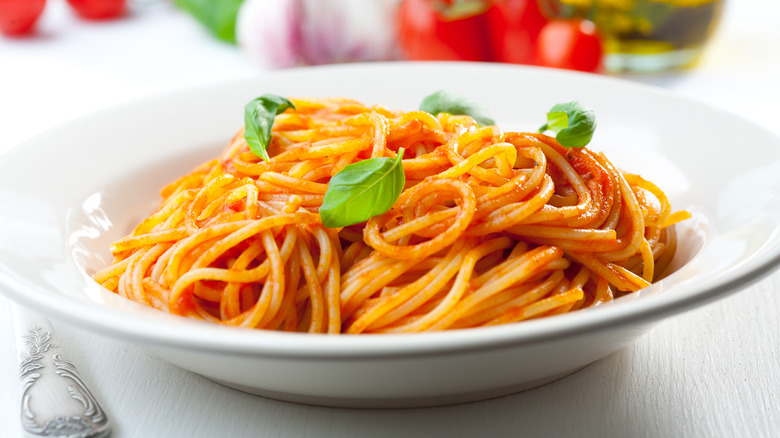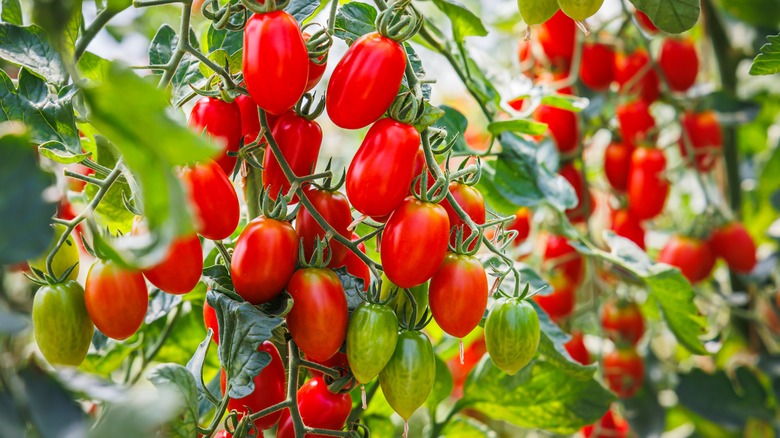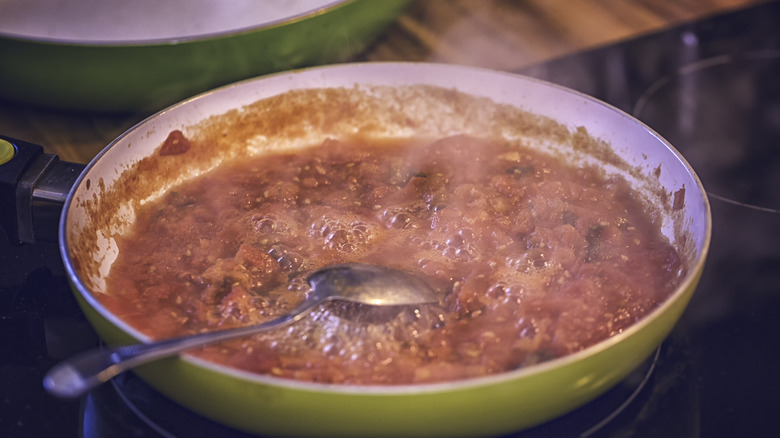Is It A Food Crime To Add Sugar To Homemade Tomato Sauce?
Many of you probably read the title of this article and immediately screamed "YES!" If you've spent any time on social media, you know that Italians are deeply proud of their national cuisine and defend it fiercely against any perceived mutilations. Few practices have incited more outrage than the act of adding sugar to tomato sauce. For many, the question of whether this is a crime isn't even up for debate, but if you take a deeper look, the issue is much more nuanced than you might imagine.
Many pasta sauce brands are shockingly high in sugar, sometimes reaching levels that rival candy bars. Considering the health risks of added sugar, it's understandable why people would reject this practice. However, there is a massive difference between using jarred sauce and making tomato sauce at home, and when it comes to the latter, you'd be surprised how many chefs favor a pinch of sugar in the mix.
Bobby Flay has been known to add a pinch of sugar to his tomato sauce, as noted in Food & Wine. Furthermore, The Guardian reveals the great Marcella Hazan, who is widely credited with introducing traditional Italian cuisine to American households, sometimes added sugar to her sauce. They are far from alone in this practice. In many Italian American households, sugar is a standard in family recipes set by Nonna (or even Nonna's Nonna). What's even more surprising, is that this practice goes back to the motherland itself.
There is a historical precedent for adding sugar to tomato sauce
The most common theory behind the practice of adding sugar to tomato sauce centers on the issue of acidity. Tomatoes weren't actually introduced to Italian cuisine until the 15th or 16th century when they were brought over from their native home in the Americas, but once they arrived, they thrived. Southern Italy would typically have two or three tomato harvests per year. Ironically, back in America, tomatoes weren't doing so well. Up until the early 1900s, the U.S. had a limited tomato supply, and it didn't stack up to Italian standards. It is widely held that Italian immigrants began adding sugar to their sauce to make up for the overly acidic tomatoes they were forced to work with in their new home.
But the history of sugar in pasta sauce actually goes back to Italy itself. Refined sugar was introduced to Italy during the Renaissance period, and at first, it was only available to wealthy aristocrats, who proudly used it as a mark of status. It didn't matter if the dish was traditionally sweet or savory, and in fact, one popular dish amongst the day's nobility involved coating pasta in butter, sugar, and cinnamon. One way or another, adding sugar to pasta became the standard for many cooks. Today, however, things are a little different.
When you should add sugar to your sauce (and when you shouldn't)
The traditional thinking behind adding sugar to tomato sauce is based on the idea that it will balance out the natural acidity of tomatoes. Tomatoes contain both sugar and acid, specifically citric and malic acids. The proportions of each can vary significantly from one tomato plant to the next, making the fruit's pH level highly inconsistent. Thus, it is impossible to set a firm rule regarding whether or not to add sugar to tomato sauce because it depends on the acidity of the specific tomatoes you're using. Just because a chef on the internet adds sugar to their sauce doesn't necessarily mean you need to add it to yours, and vice versa.
Overly acidic tomatoes are becoming less and less of a problem. Most tomato sauce recipes are based on canned tomatoes, and canning companies carefully regulate the pH level of their products. So, the need to add sugar to tomato sauce is declining, but there may still be exceptions. It's best to make your sauce without sugar at first, then taste it and add a pinch if necessary. There are also ways to sweeten sauces that don't rely on refined sugar. Giada De Laurentiis uses carrots to add a more nuanced touch of sweetness.


